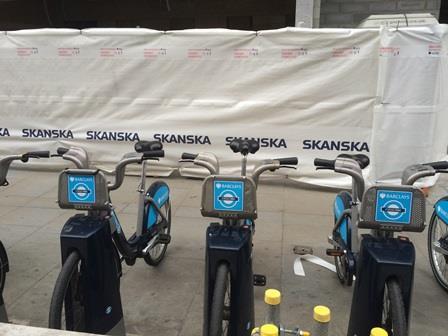
Last month’s meeting of the Construction Logistics and Cyclist Safety (Clocs) working group laid bare a shift in the emphasis around efforts to make roads safer for vulnerable users, while keeping the wheels of the road transport industry turning.
Held at London’s Guildhall the event, the third meeting of Clocs since the initial report in May of last year followed by December’s launch of the Standard for construction logistics: managing work related road, was a who’s who of the construction logistics sector.
With around 70 organisations now in Clocs membership (and Clocs now existing as its own brand at clocs.org.uk and on Mace building sites) it was also clear that while Clocs was born out of Transport for London’s (TfL) reaction to a London problem, this is now a national response.
Attendes included Cemex, Conway, Lafarge Tarmac, Laing O’Rourke, Costain, Carillion, O’Donovan and Skanska.
Keynote
Keynote speaker, TfL traffic commissioner Sir Peter Hendy CBE, said: “There is a push to make Clocs national standard." He also who revealed he is having ongoing meetings with officials around the country to achieve exactly this, and make sure there aren’t multiple standards for different parts of the country.
Hendy also paid tribute to the industry’s efforts in his keynote speech, and underlined the importance given London’s current construction boom.
Taking a swipe at the “shamelessly one-sided” media reporting of cyclist deaths in the capital, Hendy nevertheless underlined both his personal commitment to Clocs and the importance of improving the current situation to avoid further tragic loss of life, given that the capital’s roads are only going to get busier.
“Clocs means that the road is now given the same importance as on site workplace safety,” he said: “I think the construction industry’s reaction to this [situation] has been tremendous. It is clear that this is an issue the construction industry is now taking seriously and wants to address.”
Hendy added that he was effectively “preaching to the converted” stating that the problem lay with those that weren’t involved and that don’t comply often even with basic safety requirements, and singled out scaffolding lorries as particularly poor when it came to compliance. “My own view is that there has been insufficient enforcement within London for a long time due to resourcing, something that the HGV Task Force has now begun to address.”
While Hendy was clear that there were still a rotten minority amongst road transport blackening the name of the sector at large, he was unequivocal about cyclists too, stating “cyclists have to behave on the roads for their own safety, as they are so vulnerable”.
Hendy also revealed that TfL and 11 organisations in the construction sector [and DHL] had signed a memorandum of understanding last month. It will see the operators explore greater collaboration via consolidation centres, and also see them combine purchasing power to push truck manufacturers to forge ahead with safer vehicle designs. This last point representing a theme running throughout the event, and underlining TfL’s new tact, namely vehicle design.








![Mercedes-Benz_eActros_600_(1)[1]](https://d2cohhpa0jt4tw.cloudfront.net/Pictures/274x183/8/2/0/17820_mercedesbenz_eactros_600_11_978080.jpg)


